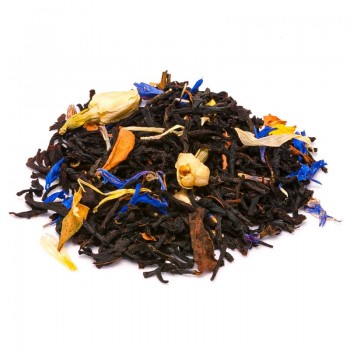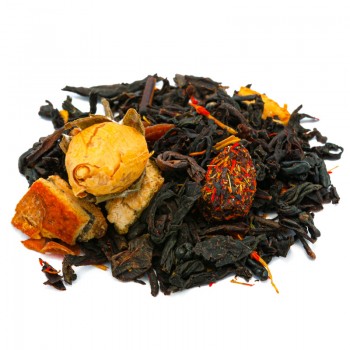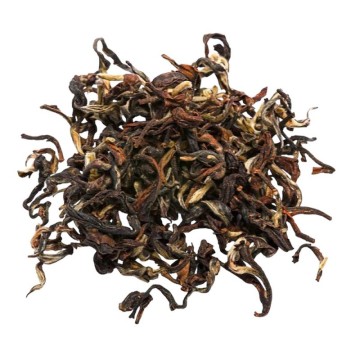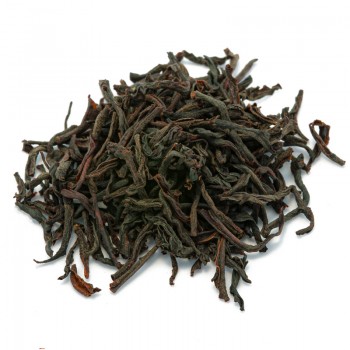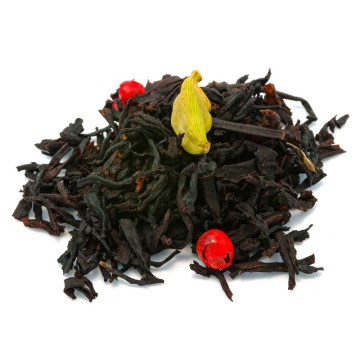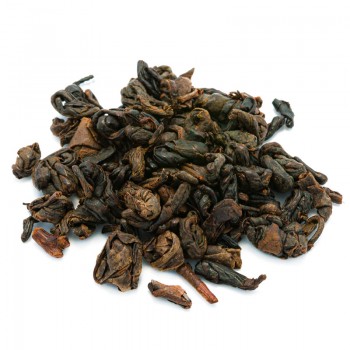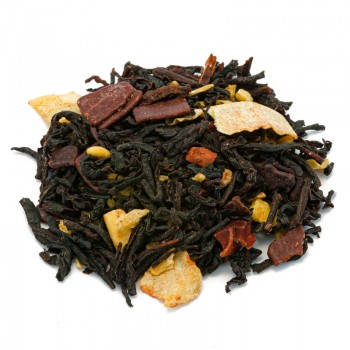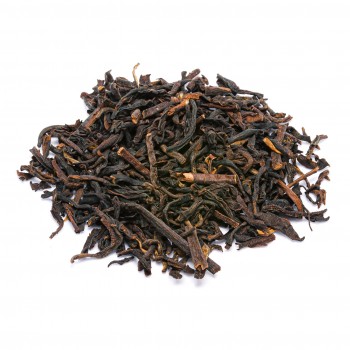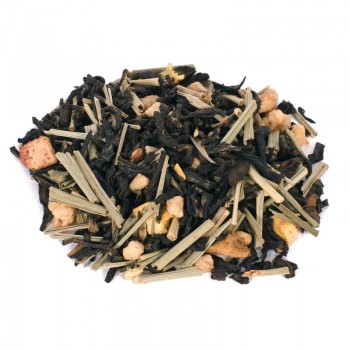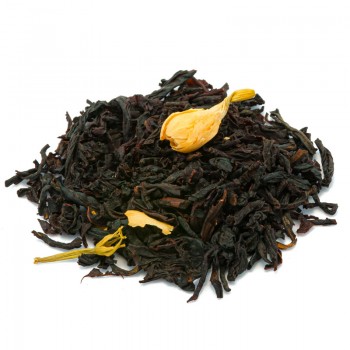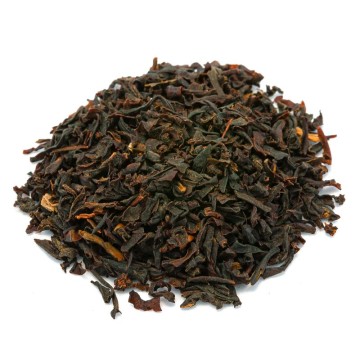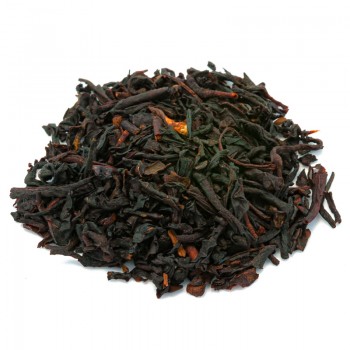Among the varieties of black tea, the leaves that come from crops in the Assam territory allow to obtain a tea popular for its rich, intense flavor, and for its energetic qualities. When tasted, Assam tea is recognized for its full-bodied malty flavor, a lively taste that is accompanied by an intense red-brown color. Its scent is intense, sweet and floral (it can evoke an aroma of rose), it can show slightly fruity notes.
Its high quantity of natural caffeine makes it a stimulating tea that wakes you up in the morning, for this reason it is known as a breakfast tea, used in England and Ireland - often the English breakfast and Irish breakfast blends contain a high percentage of Assam black tea.
Assam black tea properties and benefits
One of the known benefits of Assam tea is given by its excellent caffeine content, which causes our body a tonic effect against physical and mental tiredness. It helps increase energy, concentration, attention and mental alertness. Many people appreciate this benefit especially in the morning, when a cup of Assam tea increases the vitality needed to face the day. Breakfast or after lunch are the best times to consume this tea, while in the evening it could disturb sleep - a possible effect for those who are sensitive to caffeine.
The combination of caffeine and L-theanine present in Assam tea facilitates the assimilation of caffeine in a stable and long-lasting way, without the excessively exciting and immediate effect of coffee.
Other benefits of Assam black tea include the high content of polyphenols including catechins, flavonoids, tannins, theaflavins, thearubigins. Polyphenols are plant-based chemicals that can provide help against the damage caused by free radicals - reactive substances produced by the body, and which can damage our cells and contribute to aging.
The antioxidants contained in Assam black tea also promote digestion and regular intestinal function. Polyphenols promote the well-being of the digestive tract, the growth and maintenance of healthy bacteria in the intestine (intestinal microbiota). Furthermore, thanks to the presence of tannins with astringent properties and slightly laxative caffeine, black tea is able to promote the balance of the digestive system in cases of constipation or diarrhea (warm).
Its diuretic effect makes this black tea useful for eliminating excess fluids, playing a useful role in purification and combating water retention. Furthermore, on a dietary level, black tea stimulates the metabolism through caffeine and promotes fat burning; it helps reduce appetite with its taste that gives the sensation of sweetness.
The polyphenols present in Assam tea can potentially also contribute to the well-being of the skin, maintain skin elasticity and slow down the aging process. When you ask which is the best black tea? the answer is not simple, given the many varieties; Assam tea is certainly one of the most appreciated for its antioxidant and energizing properties. To fully exploit the benefits of this black tea, it is useful to infuse it with loose leaves and not add milk or sugar.
Nutritional values of Assam black tea
This drink has a strong nutritional impact thanks to the content of antioxidant polyphenols (flavonoids, catechins, flavanols). It provides essential amino acids (including L-theanine), B vitamins and minerals such as magnesium, potassium, fluorine, calcium, zinc, phosphorus. In addition to tannins and methylxanthines, alkaloids that include caffeine (theine), theophylline and theobromine.
How to prepare Assam black tea
Insert about 3-5 grams of tea leaves into a cup (250 ml), in water at a temperature of 90-95 °C. Leave to infuse for 3 to 5 minutes before drinking.
How to buy Assam black tea?
Our online spice and tea shop allows you to buy the leaves of this black tea, in convenient packs of 25 g, 50 g, 75 g, 100 g, 150 g, 300 g. The freshness-preserving packaging allows the product to remain intact for a long time, and the loose Assam tea version helps you calculate exactly how many grams of product you need for your cup or teapot.
Where does Assam black tea come from?
This tea is obtained from the leaves of the Camellia sinensis plant, in its assamica variety, native to India. Camellia assamica differs from the sinesins sinensis variety, because it is a robust plant that, instead of being a shrub, can grow like a real tree (up to about 13 meters). It has long leaves (about 15 cm), broad and robust, adapted to the hot-humid climate and perfect for obtaining black teas such as Assam and Ceylon.
The tea that comes from the ter
Among the varieties of black tea, the leaves that come from crops in the Assam territory allow to obtain a tea popular for its rich, intense flavor, and for its energetic qualities. When tasted, Assam tea is recognized for its full-bodied malty flavor, a lively taste that is accompanied by an intense red-brown color. Its scent is intense, sweet and floral (it can evoke an aroma of rose), it can show slightly fruity notes.
Its high quantity of natural caffeine makes it a stimulating tea that wakes you up in the morning, for this reason it is known as a breakfast tea, used in England and Ireland - often the English breakfast and Irish breakfast blends contain a high percentage of Assam black tea.
Assam black tea properties and benefits
One of the known benefits of Assam tea is given by its excellent caffeine content, which causes our body a tonic effect against physical and mental tiredness. It helps increase energy, concentration, attention and mental alertness. Many people appreciate this benefit especially in the morning, when a cup of Assam tea increases the vitality needed to face the day. Breakfast or after lunch are the best times to consume this tea, while in the evening it could disturb sleep - a possible effect for those who are sensitive to caffeine.
The combination of caffeine and L-theanine present in Assam tea facilitates the assimilation of caffeine in a stable and long-lasting way, without the excessively exciting and immediate effect of coffee.
Other benefits of Assam black tea include the high content of polyphenols including catechins, flavonoids, tannins, theaflavins, thearubigins. Polyphenols are plant-based chemicals that can provide help against the damage caused by free radicals - reactive substances produced by the body, and which can damage our cells and contribute to aging.
The antioxidants contained in Assam black tea also promote digestion and regular intestinal function. Polyphenols promote the well-being of the digestive tract, the growth and maintenance of healthy bacteria in the intestine (intestinal microbiota). Furthermore, thanks to the presence of tannins with astringent properties and slightly laxative caffeine, black tea is able to promote the balance of the digestive system in cases of constipation or diarrhea (warm).
Its diuretic effect makes this black tea useful for eliminating excess fluids, playing a useful role in purification and combating water retention. Furthermore, on a dietary level, black tea stimulates the metabolism through caffeine and promotes fat burning; it helps reduce appetite with its taste that gives the sensation of sweetness.
The polyphenols present in Assam tea can potentially also contribute to the well-being of the skin, maintain skin elasticity and slow down the aging process. When you ask which is the best black tea? the answer is not simple, given the many varieties; Assam tea is certainly one of the most appreciated for its antioxidant and energizing properties. To fully exploit the benefits of this black tea, it is useful to infuse it with loose leaves and not add milk or sugar.
Nutritional values of Assam black tea
This drink has a strong nutritional impact thanks to the content of antioxidant polyphenols (flavonoids, catechins, flavanols). It provides essential amino acids (including L-theanine), B vitamins and minerals such as magnesium, potassium, fluorine, calcium, zinc, phosphorus. In addition to tannins and methylxanthines, alkaloids that include caffeine (theine), theophylline and theobromine.
How to prepare Assam black tea
Insert about 3-5 grams of tea leaves into a cup (250 ml), in water at a temperature of 90-95 °C. Leave to infuse for 3 to 5 minutes before drinking.
How to buy Assam black tea?
Our online spice and tea shop allows you to buy the leaves of this black tea, in convenient packs of 25 g, 50 g, 75 g, 100 g, 150 g, 300 g. The freshness-preserving packaging allows the product to remain intact for a long time, and the loose Assam tea version helps you calculate exactly how many grams of product you need for your cup or teapot.
Where does Assam black tea come from?
This tea is obtained from the leaves of the Camellia sinensis plant, in its assamica variety, native to India. Camellia assamica differs from the sinesins sinensis variety, because it is a robust plant that, instead of being a shrub, can grow like a real tree (up to about 13 meters). It has long leaves (about 15 cm), broad and robust, adapted to the hot-humid climate and perfect for obtaining black teas such as Assam and Ceylon.
The tea that comes from the ter
Among the varieties of black tea, the leaves that come from crops in the Assam territory allow to obtain a tea popular for its rich, intense flavor, and for its energetic qualities. When tasted, Assam tea is recognized for its full-bodied malty flavor, a lively taste that is accompanied by an intense red-brown color. Its scent is intense, sweet and floral (it can evoke an aroma of rose), it can show slightly fruity notes.
Its high quantity of natural caffeine makes it a stimulating tea that wakes you up in the morning, for this reason it is known as a breakfast tea, used in England and Ireland - often the English breakfast and Irish breakfast blends contain a high percentage of Assam black tea.
Assam black tea properties and benefits
One of the known benefits of Assam tea is given by its excellent caffeine content, which causes our body a tonic effect against physical and mental tiredness. It helps increase energy, concentration, attention and mental alertness. Many people appreciate this benefit especially in the morning, when a cup of Assam tea increases the vitality needed to face the day. Breakfast or after lunch are the best times to consume this tea, while in the evening it could disturb sleep - a possible effect for those who are sensitive to caffeine.
The combination of caffeine and L-theanine present in Assam tea facilitates the assimilation of caffeine in a stable and long-lasting way, without the excessively exciting and immediate effect of coffee.
Other benefits of Assam black tea include the high content of polyphenols including catechins, flavonoids, tannins, theaflavins, thearubigins. Polyphenols are plant-based chemicals that can provide help against the damage caused by free radicals - reactive substances produced by the body, and which can damage our cells and contribute to aging.
The antioxidants contained in Assam black tea also promote digestion and regular intestinal function. Polyphenols promote the well-being of the digestive tract, the growth and maintenance of healthy bacteria in the intestine (intestinal microbiota). Furthermore, thanks to the presence of tannins with astringent properties and slightly laxative caffeine, black tea is able to promote the balance of the digestive system in cases of constipation or diarrhea (warm).
Its diuretic effect makes this black tea useful for eliminating excess fluids, playing a useful role in purification and combating water retention. Furthermore, on a dietary level, black tea stimulates the metabolism through caffeine and promotes fat burning; it helps reduce appetite with its taste that gives the sensation of sweetness.
The polyphenols present in Assam tea can potentially also contribute to the well-being of the skin, maintain skin elasticity and slow down the aging process. When you ask which is the best black tea? the answer is not simple, given the many varieties; Assam tea is certainly one of the most appreciated for its antioxidant and energizing properties. To fully exploit the benefits of this black tea, it is useful to infuse it with loose leaves and not add milk or sugar.
Nutritional values of Assam black tea
This drink has a strong nutritional impact thanks to the content of antioxidant polyphenols (flavonoids, catechins, flavanols). It provides essential amino acids (including L-theanine), B vitamins and minerals such as magnesium, potassium, fluorine, calcium, zinc, phosphorus. In addition to tannins and methylxanthines, alkaloids that include caffeine (theine), theophylline and theobromine.
How to prepare Assam black tea
Insert about 3-5 grams of tea leaves into a cup (250 ml), in water at a temperature of 90-95 °C. Leave to infuse for 3 to 5 minutes before drinking.
How to buy Assam black tea?
Our online spice and tea shop allows you to buy the leaves of this black tea, in convenient packs of 25 g, 50 g, 75 g, 100 g, 150 g, 300 g. The freshness-preserving packaging allows the product to remain intact for a long time, and the loose Assam tea version helps you calculate exactly how many grams of product you need for your cup or teapot.
Where does Assam black tea come from?
This tea is obtained from the leaves of the Camellia sinensis plant, in its assamica variety, native to India. Camellia assamica differs from the sinesins sinensis variety, because it is a robust plant that, instead of being a shrub, can grow like a real tree (up to about 13 meters). It has long leaves (about 15 cm), broad and robust, adapted to the hot-humid climate and perfect for obtaining black teas such as Assam and Ceylon.
The tea that comes from the ter
Among the varieties of black tea, the leaves that come from crops in the Assam territory allow to obtain a tea popular for its rich, intense flavor, and for its energetic qualities. When tasted, Assam tea is recognized for its full-bodied malty flavor, a lively taste that is accompanied by an intense red-brown color. Its scent is intense, sweet and floral (it can evoke an aroma of rose), it can show slightly fruity notes.
Its high quantity of natural caffeine makes it a stimulating tea that wakes you up in the morning, for this reason it is known as a breakfast tea, used in England and Ireland - often the English breakfast and Irish breakfast blends contain a high percentage of Assam black tea.
Assam black tea properties and benefits
One of the known benefits of Assam tea is given by its excellent caffeine content, which causes our body a tonic effect against physical and mental tiredness. It helps increase energy, concentration, attention and mental alertness. Many people appreciate this benefit especially in the morning, when a cup of Assam tea increases the vitality needed to face the day. Breakfast or after lunch are the best times to consume this tea, while in the evening it could disturb sleep - a possible effect for those who are sensitive to caffeine.
The combination of caffeine and L-theanine present in Assam tea facilitates the assimilation of caffeine in a stable and long-lasting way, without the excessively exciting and immediate effect of coffee.
Other benefits of Assam black tea include the high content of polyphenols including catechins, flavonoids, tannins, theaflavins, thearubigins. Polyphenols are plant-based chemicals that can provide help against the damage caused by free radicals - reactive substances produced by the body, and which can damage our cells and contribute to aging.
The antioxidants contained in Assam black tea also promote digestion and regular intestinal function. Polyphenols promote the well-being of the digestive tract, the growth and maintenance of healthy bacteria in the intestine (intestinal microbiota). Furthermore, thanks to the presence of tannins with astringent properties and slightly laxative caffeine, black tea is able to promote the balance of the digestive system in cases of constipation or diarrhea (warm).
Its diuretic effect makes this black tea useful for eliminating excess fluids, playing a useful role in purification and combating water retention. Furthermore, on a dietary level, black tea stimulates the metabolism through caffeine and promotes fat burning; it helps reduce appetite with its taste that gives the sensation of sweetness.
The polyphenols present in Assam tea can potentially also contribute to the well-being of the skin, maintain skin elasticity and slow down the aging process. When you ask which is the best black tea? the answer is not simple, given the many varieties; Assam tea is certainly one of the most appreciated for its antioxidant and energizing properties. To fully exploit the benefits of this black tea, it is useful to infuse it with loose leaves and not add milk or sugar.
Nutritional values of Assam black tea
This drink has a strong nutritional impact thanks to the content of antioxidant polyphenols (flavonoids, catechins, flavanols). It provides essential amino acids (including L-theanine), B vitamins and minerals such as magnesium, potassium, fluorine, calcium, zinc, phosphorus. In addition to tannins and methylxanthines, alkaloids that include caffeine (theine), theophylline and theobromine.
How to prepare Assam black tea
Insert about 3-5 grams of tea leaves into a cup (250 ml), in water at a temperature of 90-95 °C. Leave to infuse for 3 to 5 minutes before drinking.
How to buy Assam black tea?
Our online spice and tea shop allows you to buy the leaves of this black tea, in convenient packs of 25 g, 50 g, 75 g, 100 g, 150 g, 300 g. The freshness-preserving packaging allows the product to remain intact for a long time, and the loose Assam tea version helps you calculate exactly how many grams of product you need for your cup or teapot.
Where does Assam black tea come from?
This tea is obtained from the leaves of the Camellia sinensis plant, in its assamica variety, native to India. Camellia assamica differs from the sinesins sinensis variety, because it is a robust plant that, instead of being a shrub, can grow like a real tree (up to about 13 meters). It has long leaves (about 15 cm), broad and robust, adapted to the hot-humid climate and perfect for obtaining black teas such as Assam and Ceylon.
The tea that comes from the ter
Among the varieties of black tea, the leaves that come from crops in the Assam territory allow to obtain a tea popular for its rich, intense flavor, and for its energetic qualities. When tasted, Assam tea is recognized for its full-bodied malty flavor, a lively taste that is accompanied by an intense red-brown color. Its scent is intense, sweet and floral (it can evoke an aroma of rose), it can show slightly fruity notes.
Its high quantity of natural caffeine makes it a stimulating tea that wakes you up in the morning, for this reason it is known as a breakfast tea, used in England and Ireland - often the English breakfast and Irish breakfast blends contain a high percentage of Assam black tea.
Assam black tea properties and benefits
One of the known benefits of Assam tea is given by its excellent caffeine content, which causes our body a tonic effect against physical and mental tiredness. It helps increase energy, concentration, attention and mental alertness. Many people appreciate this benefit especially in the morning, when a cup of Assam tea increases the vitality needed to face the day. Breakfast or after lunch are the best times to consume this tea, while in the evening it could disturb sleep - a possible effect for those who are sensitive to caffeine.
The combination of caffeine and L-theanine present in Assam tea facilitates the assimilation of caffeine in a stable and long-lasting way, without the excessively exciting and immediate effect of coffee.
Other benefits of Assam black tea include the high content of polyphenols including catechins, flavonoids, tannins, theaflavins, thearubigins. Polyphenols are plant-based chemicals that can provide help against the damage caused by free radicals - reactive substances produced by the body, and which can damage our cells and contribute to aging.
The antioxidants contained in Assam black tea also promote digestion and regular intestinal function. Polyphenols promote the well-being of the digestive tract, the growth and maintenance of healthy bacteria in the intestine (intestinal microbiota). Furthermore, thanks to the presence of tannins with astringent properties and slightly laxative caffeine, black tea is able to promote the balance of the digestive system in cases of constipation or diarrhea (warm).
Its diuretic effect makes this black tea useful for eliminating excess fluids, playing a useful role in purification and combating water retention. Furthermore, on a dietary level, black tea stimulates the metabolism through caffeine and promotes fat burning; it helps reduce appetite with its taste that gives the sensation of sweetness.
The polyphenols present in Assam tea can potentially also contribute to the well-being of the skin, maintain skin elasticity and slow down the aging process. When you ask which is the best black tea? the answer is not simple, given the many varieties; Assam tea is certainly one of the most appreciated for its antioxidant and energizing properties. To fully exploit the benefits of this black tea, it is useful to infuse it with loose leaves and not add milk or sugar.
Nutritional values of Assam black tea
This drink has a strong nutritional impact thanks to the content of antioxidant polyphenols (flavonoids, catechins, flavanols). It provides essential amino acids (including L-theanine), B vitamins and minerals such as magnesium, potassium, fluorine, calcium, zinc, phosphorus. In addition to tannins and methylxanthines, alkaloids that include caffeine (theine), theophylline and theobromine.
How to prepare Assam black tea
Insert about 3-5 grams of tea leaves into a cup (250 ml), in water at a temperature of 90-95 °C. Leave to infuse for 3 to 5 minutes before drinking.
How to buy Assam black tea?
Our online spice and tea shop allows you to buy the leaves of this black tea, in convenient packs of 25 g, 50 g, 75 g, 100 g, 150 g, 300 g. The freshness-preserving packaging allows the product to remain intact for a long time, and the loose Assam tea version helps you calculate exactly how many grams of product you need for your cup or teapot.
Where does Assam black tea come from?
This tea is obtained from the leaves of the Camellia sinensis plant, in its assamica variety, native to India. Camellia assamica differs from the sinesins sinensis variety, because it is a robust plant that, instead of being a shrub, can grow like a real tree (up to about 13 meters). It has long leaves (about 15 cm), broad and robust, adapted to the hot-humid climate and perfect for obtaining black teas such as Assam and Ceylon.
The tea that comes from the ter
Among the varieties of black tea, the leaves that come from crops in the Assam territory allow to obtain a tea popular for its rich, intense flavor, and for its energetic qualities. When tasted, Assam tea is recognized for its full-bodied malty flavor, a lively taste that is accompanied by an intense red-brown color. Its scent is intense, sweet and floral (it can evoke an aroma of rose), it can show slightly fruity notes.
Its high quantity of natural caffeine makes it a stimulating tea that wakes you up in the morning, for this reason it is known as a breakfast tea, used in England and Ireland - often the English breakfast and Irish breakfast blends contain a high percentage of Assam black tea.
Assam black tea properties and benefits
One of the known benefits of Assam tea is given by its excellent caffeine content, which causes our body a tonic effect against physical and mental tiredness. It helps increase energy, concentration, attention and mental alertness. Many people appreciate this benefit especially in the morning, when a cup of Assam tea increases the vitality needed to face the day. Breakfast or after lunch are the best times to consume this tea, while in the evening it could disturb sleep - a possible effect for those who are sensitive to caffeine.
The combination of caffeine and L-theanine present in Assam tea facilitates the assimilation of caffeine in a stable and long-lasting way, without the excessively exciting and immediate effect of coffee.
Other benefits of Assam black tea include the high content of polyphenols including catechins, flavonoids, tannins, theaflavins, thearubigins. Polyphenols are plant-based chemicals that can provide help against the damage caused by free radicals - reactive substances produced by the body, and which can damage our cells and contribute to aging.
The antioxidants contained in Assam black tea also promote digestion and regular intestinal function. Polyphenols promote the well-being of the digestive tract, the growth and maintenance of healthy bacteria in the intestine (intestinal microbiota). Furthermore, thanks to the presence of tannins with astringent properties and slightly laxative caffeine, black tea is able to promote the balance of the digestive system in cases of constipation or diarrhea (warm).
Its diuretic effect makes this black tea useful for eliminating excess fluids, playing a useful role in purification and combating water retention. Furthermore, on a dietary level, black tea stimulates the metabolism through caffeine and promotes fat burning; it helps reduce appetite with its taste that gives the sensation of sweetness.
The polyphenols present in Assam tea can potentially also contribute to the well-being of the skin, maintain skin elasticity and slow down the aging process. When you ask which is the best black tea? the answer is not simple, given the many varieties; Assam tea is certainly one of the most appreciated for its antioxidant and energizing properties. To fully exploit the benefits of this black tea, it is useful to infuse it with loose leaves and not add milk or sugar.
Nutritional values of Assam black tea
This drink has a strong nutritional impact thanks to the content of antioxidant polyphenols (flavonoids, catechins, flavanols). It provides essential amino acids (including L-theanine), B vitamins and minerals such as magnesium, potassium, fluorine, calcium, zinc, phosphorus. In addition to tannins and methylxanthines, alkaloids that include caffeine (theine), theophylline and theobromine.
How to prepare Assam black tea
Insert about 3-5 grams of tea leaves into a cup (250 ml), in water at a temperature of 90-95 °C. Leave to infuse for 3 to 5 minutes before drinking.
How to buy Assam black tea?
Our online spice and tea shop allows you to buy the leaves of this black tea, in convenient packs of 25 g, 50 g, 75 g, 100 g, 150 g, 300 g. The freshness-preserving packaging allows the product to remain intact for a long time, and the loose Assam tea version helps you calculate exactly how many grams of product you need for your cup or teapot.
Where does Assam black tea come from?
This tea is obtained from the leaves of the Camellia sinensis plant, in its assamica variety, native to India. Camellia assamica differs from the sinesins sinensis variety, because it is a robust plant that, instead of being a shrub, can grow like a real tree (up to about 13 meters). It has long leaves (about 15 cm), broad and robust, adapted to the hot-humid climate and perfect for obtaining black teas such as Assam and Ceylon.
The tea that comes from the ter
Among the varieties of black tea, the leaves that come from crops in the Assam territory allow to obtain a tea popular for its rich, intense flavor, and for its energetic qualities. When tasted, Assam tea is recognized for its full-bodied malty flavor, a lively taste that is accompanied by an intense red-brown color. Its scent is intense, sweet and floral (it can evoke an aroma of rose), it can show slightly fruity notes.
Its high quantity of natural caffeine makes it a stimulating tea that wakes you up in the morning, for this reason it is known as a breakfast tea, used in England and Ireland - often the English breakfast and Irish breakfast blends contain a high percentage of Assam black tea.
Assam black tea properties and benefits
One of the known benefits of Assam tea is given by its excellent caffeine content, which causes our body a tonic effect against physical and mental tiredness. It helps increase energy, concentration, attention and mental alertness. Many people appreciate this benefit especially in the morning, when a cup of Assam tea increases the vitality needed to face the day. Breakfast or after lunch are the best times to consume this tea, while in the evening it could disturb sleep - a possible effect for those who are sensitive to caffeine.
The combination of caffeine and L-theanine present in Assam tea facilitates the assimilation of caffeine in a stable and long-lasting way, without the excessively exciting and immediate effect of coffee.
Other benefits of Assam black tea include the high content of polyphenols including catechins, flavonoids, tannins, theaflavins, thearubigins. Polyphenols are plant-based chemicals that can provide help against the damage caused by free radicals - reactive substances produced by the body, and which can damage our cells and contribute to aging.
The antioxidants contained in Assam black tea also promote digestion and regular intestinal function. Polyphenols promote the well-being of the digestive tract, the growth and maintenance of healthy bacteria in the intestine (intestinal microbiota). Furthermore, thanks to the presence of tannins with astringent properties and slightly laxative caffeine, black tea is able to promote the balance of the digestive system in cases of constipation or diarrhea (warm).
Its diuretic effect makes this black tea useful for eliminating excess fluids, playing a useful role in purification and combating water retention. Furthermore, on a dietary level, black tea stimulates the metabolism through caffeine and promotes fat burning; it helps reduce appetite with its taste that gives the sensation of sweetness.
The polyphenols present in Assam tea can potentially also contribute to the well-being of the skin, maintain skin elasticity and slow down the aging process. When you ask which is the best black tea? the answer is not simple, given the many varieties; Assam tea is certainly one of the most appreciated for its antioxidant and energizing properties. To fully exploit the benefits of this black tea, it is useful to infuse it with loose leaves and not add milk or sugar.
Nutritional values of Assam black tea
This drink has a strong nutritional impact thanks to the content of antioxidant polyphenols (flavonoids, catechins, flavanols). It provides essential amino acids (including L-theanine), B vitamins and minerals such as magnesium, potassium, fluorine, calcium, zinc, phosphorus. In addition to tannins and methylxanthines, alkaloids that include caffeine (theine), theophylline and theobromine.
How to prepare Assam black tea
Insert about 3-5 grams of tea leaves into a cup (250 ml), in water at a temperature of 90-95 °C. Leave to infuse for 3 to 5 minutes before drinking.
How to buy Assam black tea?
Our online spice and tea shop allows you to buy the leaves of this black tea, in convenient packs of 25 g, 50 g, 75 g, 100 g, 150 g, 300 g. The freshness-preserving packaging allows the product to remain intact for a long time, and the loose Assam tea version helps you calculate exactly how many grams of product you need for your cup or teapot.
Where does Assam black tea come from?
This tea is obtained from the leaves of the Camellia sinensis plant, in its assamica variety, native to India. Camellia assamica differs from the sinesins sinensis variety, because it is a robust plant that, instead of being a shrub, can grow like a real tree (up to about 13 meters). It has long leaves (about 15 cm), broad and robust, adapted to the hot-humid climate and perfect for obtaining black teas such as Assam and Ceylon.
The tea that comes from the terAssam region, is grown in this north-eastern region of India that is located along the Brahmaputra River; an area called Brahmaputra Valley, bordering Bangladesh and Myanmar, which reaches the Bay of Bengal. Assam is the largest tea growing and producing region in the world, where Camellia assamica is grown at sea level in so-called “gardens”, differentiated according to the value of the tea, more or less valuable.
The hot and humid climate, with heavy rainfall, is perfect for the growth of the plant; while the weather conditions and fertile soil help create the malty flavor of Assam tea, distinct from other black teas. This is how some of the best teas ever are born, also called "women's tea" because 80% of the harvesting and processing of Assam is done by women.
Like all black teas, Assam also stands out because it is subjected to a particular process: it comes from the complete oxidation of its leaves, a different process than the processing of green tea or white tea. The chemical process of enzymatic oxidation makes the leaves darker, develops a more intense flavor and a robust aroma; in the case of Assam black tea, it makes a dark red color for infusion.
Oxidation occurs after the harvesting of the fresh Assam tea leaves, which are withered, rolled and then oxidized - exposing them to oxygen in a temperature-controlled environment.
Assam black tea, what are the contraindications
Although the consumption of tea is considered safe for adults, its caffeine content must be considered. Excessive caffeine consumption can cause agitation, difficulty sleeping, nervousness, headaches, changes in heart rate and increased blood pressure; it can increase the conditions of gastritis and esophageal reflux. It is generally recommended not to exceed the doses of caffeine per day for adults, and to keep consumption within 3-4 standard cups of Assam tea. In addition, this tea contains tannins, which can interfere with the absorption of iron during meals. Therefore, anemic subjects are usually recommended to take tea away from meals. Caution in the dose is advised for pregnant and breastfeeding women.

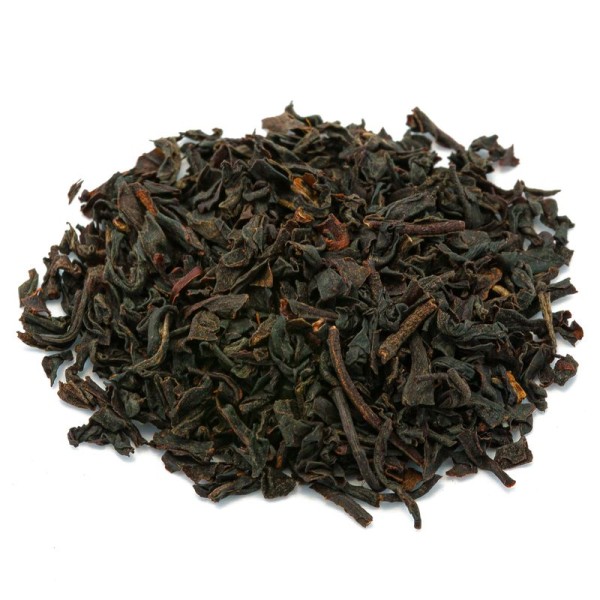









 No reward points for this product.
No reward points for this product.
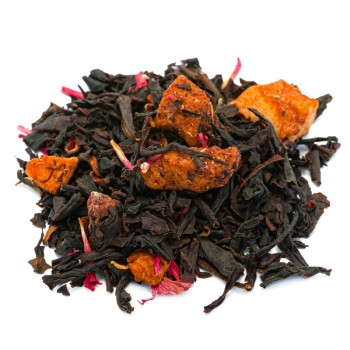
![Black tea Kaproret GFOP [Natura d'Oriente]](https://www.naturadoriente.com/3387-home_default/kaproret-black-tea-gfop.jpg)
![black tea Irish Rum [Natura d'Oriente]](https://www.naturadoriente.com/3388-home_default/black-tea-irish-rum-.jpg)
